NauticEd Navigator gives you personalized
course recommendations based on your
sailing goals and experience
Chart a Course to Your Sailing Future
 Select my goals
Select my goals NauticEd Navigator gives you personalized
course recommendations based on your
sailing goals and experience
 Select my goals
Select my goals
This online course is designed to teach sailors how to confidently handle sailboats in diverse docking and wind conditions, ensuring smooth docking every time. Covering monohulls with single and dual rudders, as well as catamarans, this course equips you with the skills to manage your vessel in various wind and docking scenarios. Additionally, you'll learn the techniques for effective Mediterranean Mooring, commonly used in the Mediterranean.
Estimated time: 4 hours
Price: $39 (or $33 with the Skipper Large Keelboat Bundle)
Enroll in NauticEd's Maneuvering Under Power and Docking Online Course and gain the theory, practical advice, and strategies necessary to dock and maneuver your sailboat like a pro. This is an absolutely essential course for all who intend to take the helm. It will save you thousands of $$$ in dents, bumps, and scratches at the marina - not to mention saving you the embarrassment and humiliation of being known as a bumper car sailor!
You will also gain access to our Virtual Reality modules which allow you to practice and gain muscle memory of all your learnings in an amazing real "virtual reality" environment. This is optional and is an upcharge done through our VR partner MarineVerse. Instructions for the VR component are in the course. Again, optional but highly advised.
Maneuvering Under Power is NauticEd's most popular course and teaches you how to maneuver your sailboat under power in diverse and challenging docking and wind conditions, allowing you to dock like a pro every time. The course includes maneuvering monohulls with single and dual rudders as well as catamarans. You'll learn how to manage your vessel in various wind directions and directions. It also includes the necessary knowledge on how to effectively do a Mediterranean Mooring used extensively in the Mediterranean.
Whether you are a beginner or an experienced sailor, this course is a must for anyone looking to improve their docking and maneuvering skills and avoid costly mistakes. Enroll now and take the first step towards becoming a competent and skilled sailor when docking and maneuvering under power.
When you have mastered the knowledge, you can then practice as much as you like in Virtual Reality through our partnership App with MarineVerse on Meta Quest 2.
We guarantee both your satisfaction AND Lifetime access to any sailing course you buy from us!
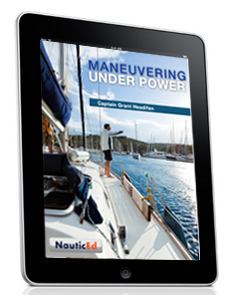
Buy this Maneuvering Under Power course as a hardcopy paper book from our Amazon Store. Videos, animations, and links are included in the book using QR codes.
Maneuvering a sailboat under power is one of the most overlooked and under-taught NECESSARY skills. When sailing in open waters it's reasonably difficult to hit something so long as you have a proper watch out, radar, and navigation skills. When maneuvering around in the marina it's reasonably easy and common to hit something namely the dock or other boats. And of course, hitting something is expensive and embarrassing.
You will receive access to our interactive online sailing lesson and the real-time graded test. This $39 course will take you about 3-4 hours to complete online including the test. The practical exercises given to you will take about 2 hours to complete on the water or in Virtual Reality. This course will give you one of the best returns on investment you have ever made. $39 here now can save you thousands of $ in damage. Looking good in the Marina? - PRICELESS.
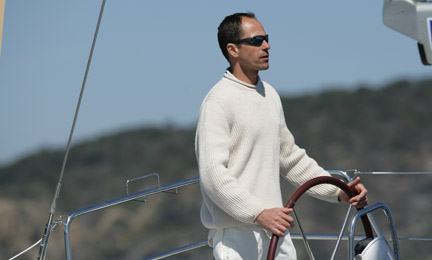 Photo Courtesy of Beneteau
Photo Courtesy of Beneteau
Foreword by the Author, Grant Headifen. Near the beginning of my open water sailing career, I chartered a 46 ft sailboat in St Maarten. In St Maarten, the charter base is located in a protected cove but with a tricky reef entrance. Therefore the charter base requires that a pilot come out to your boat in a speedboat, jump on board, bring the boat through the reef, and park it in the slip at the marina for you. I spent some time observing this very talented Rastafarian expertly maneuver my chartered boat into the slip. It was a maneuvering job with which I was very impressed. Why? Well, just days before I had knocked the BBQ off the back of the 46 ft sailboat because I could not maneuver the boat in a tight marina with 20 knots of side wind just as it was getting dark. I was trying to back up to a concrete wall and simultaneously lasso pilings as they went past to hold the front of the boat in place and not hit the wall. As captain, I was seeing very quickly that my open water experience was not paying off and was about to cost me, the charter company, and the insurance company a lot of money.
I remember a year later maneuvering a Beneteau 50 ft sailboat into the marina in the beautiful port of Bonifacio, Corsica. Our slip was right next to the sidewalk restaurant loaded with tourists, so it was imperative to my ego to get it right. Well, I did but actually, I still think it was really more luck than anything else. As we sat on the back of the boat celebrating a no-damage docking we watched a crew expertly maneuver their boat backward down a row of slips, turn right angles then back their boat into a tight slip, stopping perfectly. We all cheered and clapped as it was very impressive. I vowed right then and there to learn the skill.
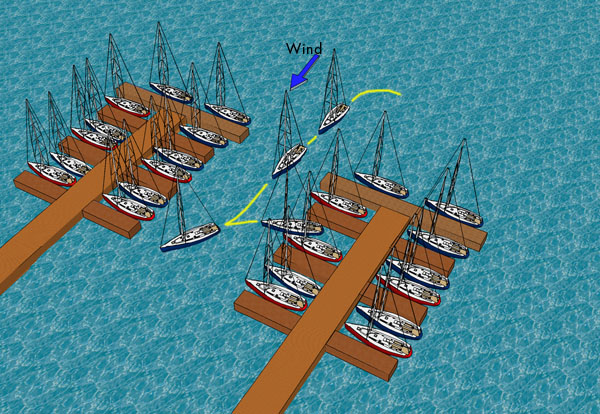
One year later I was smiling as I maneuvered a 50 ft sailboat in a very tight harbor in Kos, Greece. You can always tell how you are doing in a busy port. If you're doing well, everyone on the other boats will be watching and will continue to drink their Gin. If you're doing bad they are all putting down their drinks and putting fenders over the side. In Greece, everyone relaxed with their Gin!
When I created the fractional ownership industry for sailors a few years later, it was obvious that a course like this needed to be developed. As a result, several thousand students have taken this course. Through 27 practical exercises, this Maneuvering Under Power course will teach you how to practice and master the skill of placing the boat wherever you want, every time in all wind conditions, with confidence. The lesson is arranged so that you can first read the material and begin to understand the theory. Each chapter also has associated practical exercises that you absolutely must perform and repeat to become an expert. The exercises are designed to get you extremely comfortable with maneuvering your boat.
Upon completion, you'll the NauticEd Maneuvering Under Power and Docking Online Course will be added to your NauticEd Sailing Resume. I'm also confident that you'll be so comfortable with maneuvering and backing your boat in a tight marina that you'll never have onlookers put down their drink and pick up a fender. You'll feel great and even if you mess it up a bit, you'll know exactly how to do it better next time. If you're hesitant about the mere $39 cost of this course, just think of the cost and embarrassment of one - just one ding into another boat. When you take this course, we guarantee you'll have less intimidation when maneuvering your boat and you'll significantly reduce damage to yours and other people's boats.
No one ever has, but if you don't think you received $39 worth of potential damage-saving value, simply contact us and we'll happily refund your investment.
In the conclusion chapter, we show you how you can access all the exercises on your mobile device and take them with you to the boat. It leads you through all the exercises you should perform on the water to learn how to maneuver and dock your sailboat under power.
Finally, I can not stress enough how important it is to engage in the optional Virtual Reality module. As with any practical skill, practicing your skills over and over is the only way to become competent. Instructions for VR are inside the course.
Please enjoy our Maneuvering a Sailboat Under Power Course (and no damage docking) bought to you by Captain Grant Headifen.
Register for the NauticEd Docking and Maneuvering a Sailboat Under Power Course now! It's Fun!
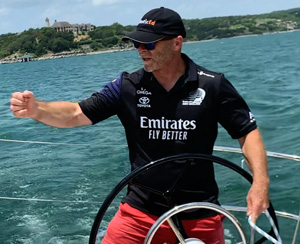
By Grant Headifen
NauticEd Global Director of Education
View Maneuvering Under Power Course excerpt
Good quiz questions - made you think!
I was challenged by this course, but enjoyed it.
Very thorough and many useful examples
Very informative and helps the mind retain information from redundancy.
A comprehensive and essential course for any boater, especially a sailor. Very indepth coverage of all elements of powering around marinas, docking, and wind in different boats. Appreciated the new tricks for dealing with current and wind.
Make sense of maneuvering. great course
Animations and videos of the procedures in real life are helpful, depth of topics covered.
Solid fundamentals. Nice of it to include crabbing for catamarans and some of the caveats around twin-rudder monohulls.
Very good tutorial and well-built animation to support the theory.
Wow! This course was fantastic. Before taking this course, I thought I understood prop wash, prop walk, springing on/off, etc. I learned so much about how to deal with many combinations of wind, current, space constraints. It was great to see all the situations, such as med mooring with an anchor, or long line ashore, or dealing with a cat with rudder forward of the prop.
All of it. Very Thorough. None of my ASA courses provided any meaningful training in this area. Very helpful.
The clarity of the writing is excellent. There is history and humor sprinkled in. The graphics and animations are state-of-the art. I wholeheartedly recommend it.
Reversing a boat has become quite a favorite of mine now and fun to teach. Please don't just give these exercisers lip service. Actually, get out and do the exercises and - who cares if others are watching - you'll be able to out back and outmaneuver them anytime after this. It's a practiced skill that you'll be glad you did next time you're in a tight marina in some exotic place with 20 knots of wind on the side and everyone is watching you. The question is - will they be nervous or impressed - it's up to you.
This exercise should take about 45 minutes and is really fun to do. Please actually do it rather than just read it. You'll learn so much and be incredibly confident afterward. It's more effective to do this on a windy day. Pick a buoy or ideally two that are about 5 boat lengths apart that are out away from the marina and, of course, during the exercises keep a good watch out for traffic.
| Exercise 9: With the boat stopped and pointing downwind, first put the wheel hard over and then rev the engine in reverse to 2300 rpm for about 2 seconds. |
| What you learned: The boat is not nearly as responsive as the same exercise in forward. In fact, it is doubtful that anything actually happened. Except for a bit of prop walk. |
| Note: The rudder only responds to act on the boat when water is flowing over it. When in reverse, the propeller does not help to push water over the rudder, and thus control of the boat is only achieved by reverse motion of the boat. |
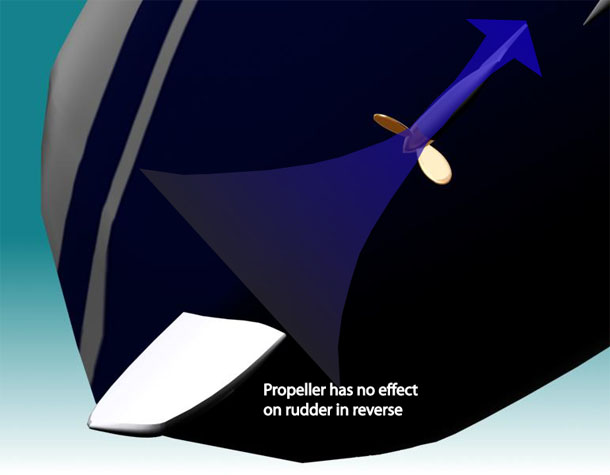
| Note: Whenever the boat is reversing, DO NOT take your hands off the wheel or allow it to spin. The fulcrum of the rudder is at the front. Water moving over the rudder will cause the rudder to slam sideways and potentially break the wheel controls. ALWAYS keep a hand tightly held on the wheel. This effect is like trying to hold a sheet of plywood on the downwind edge against the wind without it flipping around on you - almost impossible. When it flips - it's going to hurt. Same as the wheel, when the back-flowing water pushes against the rudder it can whip the rudder over - spin the wheel very fast and slam the workings for the wheel to rudder connections very hard and very likely cause damage. Backing in a marina with high winds is the last place you want the rudder connection to come off. Scared? Don't be, just don't let go of the wheel when backing. |
| Note: Whenever in reverse, only put the wheel a maximum of 80% of the way hard over. If it is all the way over the rubber acts more like a vertical bulldozer blade and reduces the turning effectiveness. |
| Note: When shifting from forward into reverse and vice versa, ALWAYS stop in neutral for 1-2 seconds before shifting gears. Drifting in a marina under high winds and a sheared propeller shaft key is not something you want to experience. Scared? Don't be, just don't shift the gear lever fast. |
| Exercise 10: With the boat pointed at about 30 degrees off the wind and idling forward at about 1000 rpm, put the engine into reverse while attempting to hold the boat straight and then begin to back up. |
| What you learned: On a windy day this is nearly impossible. The wind will take over and push the bow downwind as soon as the boat stops and thus water stops flowing over the rudder. Regaining control and trying to get the boat to begin backing up while staying on course is difficult and will use up a lot of space. Space that is at a premium in a marina. So instead, always start your backing with the wind to your stern even if that has you initially pointing in the wrong direction. |
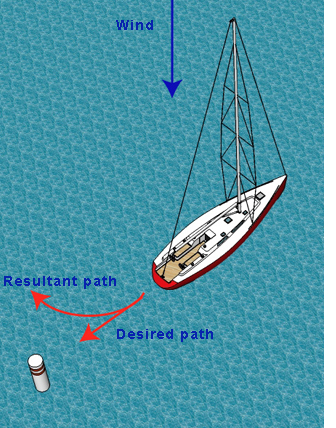
Even if you try it the other way to counteract the prop walk - in high enough winds your bow will still be blown downwind.
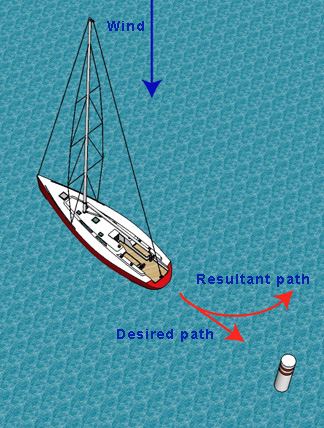
| Exercise 11: With the boat stopped and positioned stern to wind - just hang out for a second and observe the boat behavior. Then move into forward gear at about 1000 rpm and slowly move forward, now put the engine in reverse at 2000 rpm. Watch the boat come to a stop and begin backing up. |
| What you learned: You'll first notice that sitting there with your stern to the wind is a stable position for the boat to be in. IE the wind really does nothing to the boat and you can hang out like this for a while. Especially in a marina when you are waiting for other boats to clear out or deciding which slip to go into. Besides a bit of prop walk, once you start going backward, the boat will hold course and will back straight without all the space used up in the exercise above. Therefore, whenever possible, always begin backing with the stern of the boat facing upwind. Let's repeat that and put it in bold - whenever possible, always begin backing with the stern of the boat facing upwind. |
| Note: There will be some effect from prop walk which will turn the stern of the boat to port. So learn to anticipate prop walk. IE you know the boat is going to pull stern to port so angle your boat as such before you start to reverse. |
| Note: Simple rule of thumb for steering a boat backward. If you want the back of the boat to go one way then turn the wheel that way. Actually, this is the same for going forward, if you want the front of a boat to go right then turn to the right. This is why you see some people turn around and get in front of the wheel when going backward because it is the same as going forward. As you get used to backing like this and especially practicing doing figure 8’s around buoys, you’ll no longer need to step around the wheel. |
Other Sailing Courses that you might enjoy:
Qualified Crew Member Sailing Course
Coastal Navigation Sailing Course
We used NauticEd and it was great in helping us achieve our sailing, and boating goals! We are a 26' Westerly Centaur that is preparing to cross the atlantic starting next Sunday, and will get across by the end of January.